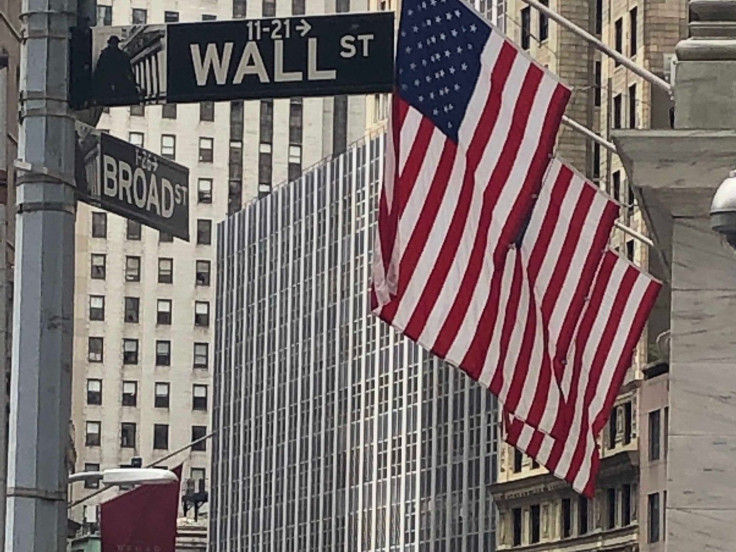Wednesday's Stock Market Close: US Equities Rise As Oil Prices Find Footing, Senate Approves New Relief Package

KEY POINTS
- Two-thirds of S&P 500 companies that have released quarterly earnings thus far have beaten estimates.
- WTI crude futures jumped to nearly $14 a barrel.
- Trump threatened to shoot down Iranian gunboats which threaten US Navy vessels
U.S. stocks rallied on Wednesday as oil prices appeared to have stabilized and the Senate passed a new relief bill for small businesses and hospitals.
The Dow Jones Industrial Average gained 456.94 points to 23,475.82, while the S&P 500 rose 62.75 points to 2,799.31 and the Nasdaq Composite Index jumped 232.15 points to 8,495.38.
Volume on the New York Stock Exchange totaled 4.24 billion shares with 2,193 issues advancing, 16 setting new highs, and 785 declining, with 21 setting new lows.
Active movers were led by Snap Inc. (SNAP), United Airlines Holdings Inc. (UAL) and American Airlines Group Inc. (AAL)
Crude prices got a boost after U.S. President Donald Trump tweeted that he “instructed the United States Navy to shoot down and destroy any and all Iranian gunboats if they harass our ships at sea.”
“The short term story in the market remains oil. Yet, this is much bigger than oil,” wrote Gregory Faranello, head of U.S. rates trading at AmeriVet Securities. “The price action over the last 48 hours not only points us back to the economy and demand side, but is showing signs of spillover and contagion in risk toward other markets.”
“This week investors are realizing that even though the crisis could soon get better, the negative impacts of having an economy which is essentially shut down are magnifying at an alarming rate. With no demand even for a couple of months, energy prices go negative as excess oil supplies balloon,” said Jim Paulsen, chief investment strategist at the Leuthold Group.
Per Magnus Nysveen, senior partner and head of analysis at Rystad Energy, warned that oil markets are facing worse challenges.
“The world is running out of places to store the oil,” he said. “When the supply and demand balance is positive or negative, then you can build or draw from storage. But when the storage gets full, then there is no buffer for this very strong imbalance that we’re seeing.”
Late Tuesday, Senate Republicans and Democrats passed a $484 billion coronavirus relief bill to assist small businesses, hospitals, and testing. The House could approve the package on Thursday.
Thus far, 84 S&P 500 companies have posted their quarterly earnings -- of those companies, 67% beat analyst profit estimates.
“Initial quarterly reports from leading U.S. companies could have been worse as the economy reels from the shutdown over the coronavirus pandemic,” said Daniel Morris, senior investment strategist at BNP Paribas Asset Management. “Not only have reported results been surprisingly strong, the [limited] guidance that companies have given about the earnings outlook has actually been slightly more positive than it was during the same period last year. Nonetheless, several companies have refrained from giving any outlook due to the high degree of uncertainty about how government support measures evolve.”
“There’s no way you can predict earnings right now,” said Michael Cuggino, portfolio manager at Pacific Heights Asset Management. “It’s virtually impossible until we have more visibility with respect to how [the] world comes out of the coronavirus on the other side.”
Overnight in Asia, markets were mixed. China’s Shanghai Composite rose 0.6%, Hong Kong’s Hang Seng gained 0.42% and Japan’s Nikkei-225 fell 0.74%.
In Europe markets closed higher, as Britain’s FTSE-100 gained 2.3%, France’s CAC-40 climbed 1.25% and Germany’s DAX rose 1.61%.
Crude oil futures surged 20.05% at $13.89 per barrel, Brent crude gained 1.57% at $20.69. Gold futures edged up 2.86%.
The euro edged down 0.4% at $1.0817 while the pound sterling rose 0.2% at $1.2318.
The yield on the 10-year Treasury jumped 8.41% to 0.619% while yield on the 30-year Treasury gained 4.99% to 1.22%.
© Copyright IBTimes 2025. All rights reserved.




















